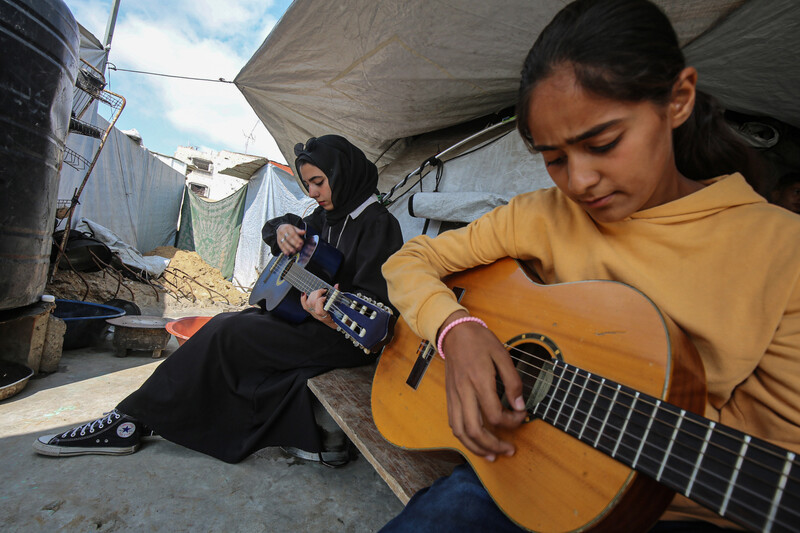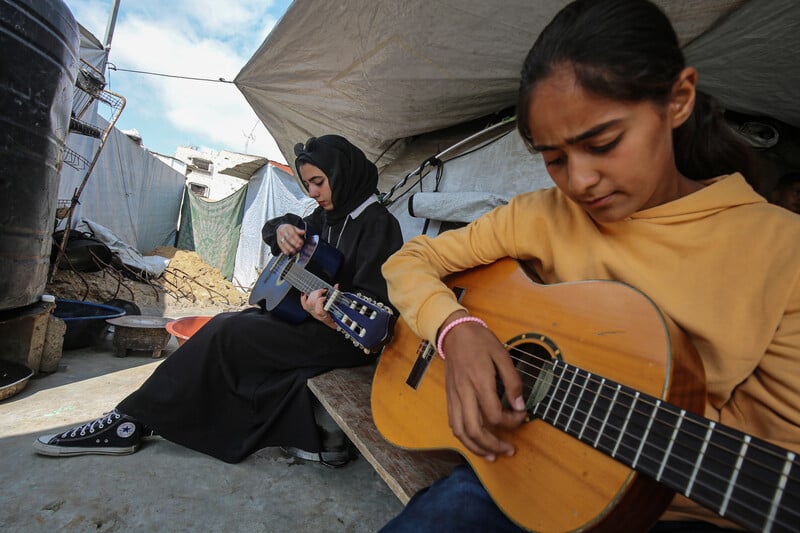
Music has provided a refuge for children during Israel’s genocide, here on 8 June.
APA images
It’s been three months since I listened to music. I haven’t even sung to myself with my inside voice, which is what I always did in moments of sadness.
The last tune I remember hearing, and singing, was Ya Rayheen ‘al-Quds Khudhuni Ma‘akum – “Take Me with You to Jerusalem” – during my music troupe’s rehearsal for a concert that was going to be part of the annual Octobar al-Wardy, or Rosy October, festival. I take part in it every year.
Music was my refuge from the ear-splitting rocket strikes. In Arabic, we call the ecstatic delight that we feel with music tarab, or enchantment, and I used to find a kind of tarab in the musical intros to newscasts, those that were then followed by news of a new massacre taking people and plants and places.
I decided to use my voice and my guitar to bring a brighter tomorrow into children’s dreams, in the face of massacres and genocide.
Like most everyone else in Gaza, I’m forced from one tent to another, from displacement camp to group shelter. I carry my music and my songs, and a rope that drags hope behind me.
I am 25. I am from Gaza City.
My father named me Marcel because he loved the singer, musician and composer Marcel Khalife. But my mother, she called me Hazem, and that became my name. That is who I am.
I inherited my love of song and homeland from my father, and music became my way of living, my way of resisting.
Possible futures for us here in Gaza were cut off with the beginning of the genocidal war. I lost my work as an artist when my recording studio was destroyed, and with it went my dream and my drive.
I was unable to do anything for months. I was lost, so many of us were.
An idea is born
I ended up in a house that became a mass shelter when I was first displaced from the north in October 2023. All the children in the house were afraid. At some point, I decided to teach them a song called Aatuna al-Tufulah, or “Give Us Childhood.” It’s a really sad song, but they took up the song with love. They sang with passion, as if a ray of sunlight burned away their fear.
An idea was born. I would use song to bring children together for psychological support in the camps and the schools. As I started, the idea developed, turning into workshops that used acting and writing, as well as music, so the children could create a theatre troupe of their own, writing their stories themselves and telling them in their own voices.
In March 2024, I set up a music tent where children could come to learn singing, performing, writing and theater. It was very popular and at one point attracted as many as 200-250 children. I was with them every day until the army ordered our evacuation from that part of Khan Younis.
The dream was cut short, and with it our togetherness.
I didn’t hear from the children for days, during which the Israeli military bombed the area. Eventually, we returned to the shelter. But only some of the children returned. Others did not.
Twenty of my students had been killed in the bombardment, I later learned. More had been injured. Our dream died with them. I decided not to bring new students to take the places of those who had been martyred. They are irreplaceable.
Music is not an activity. It is a memory, a trace, a forever.
Israel’s genocidal war has not killed me yet – but it has killed the notions of humanity I once held to be truth.
I would sing with the children and watch them smile, despite everything. One air raid was enough to destroy everything we had built and force us to move.
In the face of oblivion
I don’t remember how many displacements it’s been now; I stopped counting after the tenth. I do know that I’ve been displaced to almost every part of the Gaza Strip, north and south.
I’ve lost friends. Khalil, Ahed, Hamed, Muhammad, Mahmoud, Majd, Waseem, Hareth … I’ve lost relatives, my mother’s brother and her sister and my cousins. The losses broke me, but I refuse to surrender to despair like a child in Gaza refuses to accept to go to sleep hungry, with neither bread nor water.
Our imposed starvation has killed what was left of this world’s humanity.
I am hungry as I write this article. A small bowl of lentil soup is all I’ve had to eat in the past two days, and this is how it’s been for us for weeks. I suffer a constant throbbing headache and a host of health problems caused directly by the lack of food and medicine.
The forced starvation would have extinguished the music tent if the bombs didn’t. The children no longer have it in them to sing. They don’t have it in them to hear or listen. Lining up for food or water is far more important now than any song of “peace.”
The sounds they produce now are the rumblings of their empty stomachs, rumblings echoed throughout the city.
But I did not write this to lament. I write to etch my voice into an eternity in the face of oblivion.
The genocide did not mold me into a person who seeks survival. It made me a person who wants to be a trace, so that it can be said that in this land of forced starvation and annihilation, there was an artist who sang for hope, though he may not have harbored it.
The song that is sung cannot be killed.
Hazem Alghosain is a musician, writer and theater practitioner.
Translated by Hazem Jamjoum.
Tags
Source link

